

MY LONG ODYSSEY IN RADIO
Hi, I'm Larry Matthews. I have had a long-term, yet erratic, career in radio that began in 1967 and continued off and on to 2005.
I hope that this page may serve to show the changes that have effected radio during this period of time. I hope you will also infer from this page that I have dearly loved being a Disc Jockey (aka Radio Personality) and I do miss the "old ways" of doing things. But there are also great advantages to the new technologies.
You will also get a chance to see just how I have aged over the past 40+ years - not a pretty sight!
PART ONE: MY RADIO HISTORY.
PART TWO: THE DEMISE OF COOL 104, ETC!
PART THREE: RADIO IN THE 21ST CENTURY.
PART FOUR: MISCELLANEOUS COLLECTION OF PHOTOS AND MEMORABILIA.
PART FIVE: A SLAB OF CONCRETE.


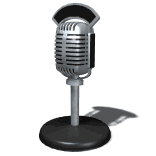
PART ONE:
MY RADIO HISTORY
The late 1960's was a great time for AM radio. Everybody listened to it and looked upon the infant FM dial as a place for elevator or "head" music. It was even difficult to find a radio with an FM dial.
I had listened to radio all of my life and loved DJ's. I really wanted to be one! I always listened to the top 40 radio stations in our area, KMYC in Marysville, KFRC in San Francisco and KROY in Sacramento. But I never thought I would get the opportunity as a teenager to go on the air.
In the Fall of 1967, when I was a Junior in High School I became aware of a high school club called "Campus Highways". Campus Highways was a group that put together a half hour radio show every Saturday afternoon at 2:30 on KAOR in Oroville, CA. I had lived in Oroville since moving up from Los Angeles in 1963 and was a 16 year old student at Oroville High School.
The group consisted of from 10-12 students and when I joined the group I also recruited my two friends, Scott Roberts and Eddie Harrison. Even though there were about 12 official members there usually were only about 5 who were considered the "core" group and we produced the shows. The shows consisted of news and features from the OHS campus and also the latest in music. As KAOR was not a "rocker" station we had an agreement with Valley Music Shop to borrow 45's of current rock songs for the afternoon.
Las Plumas High School also had a high school program on KAOR that was broadcast on Saturday afternoons. Their program was called "The Thundering Herd". Lester Temple and Caryl Martinson were those who mostly contributed to that program. Lester advises that he is still in radio and has worked in the San Francisco Bay Area at KITS-Live105 FM for 18 years.
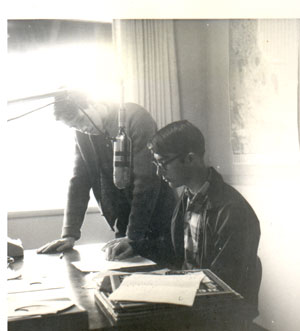
Eddie Harrison and myself on "Campus Highways". KAOR, December 1967.
I stayed in "Campus Highways" for the last two years of high school. I met some great DJ's who were really helpful and became good friends. Dave Lane, Murry Stapp (aka Mark Chevrolet), Curt Nelson, Bill Thompson (aka Dudley) and Ron Palmer (who left KAOR in early 1969 and ended up working for KHSL TV in Chico until he retired in 2000 after more than 30 years at that station).
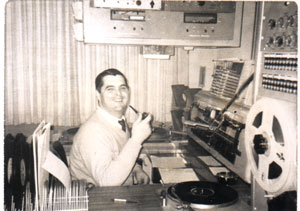
Ron Palmer at KAOR. December 1967. A great guy and a great talent. He was also the creator of "Campus Highways". Ron passed away on July 7, 2015 at age 76. RIP Ron.
Murry Stapp was especially supportive of me in getting my Third Class FCC radiotelephone license that Scott and I both obtained on 12-31-68 in San Francisco.
In the Spring of 1969, just prior to my graduation from high school Murry also supported my being hired at KAOR as a full time DJ. Four days before I graduated I began working there full time. Murry and I reconnected in December 2009. I was very glad to hear that he is well. In 2010 he published a novel about radio in the 1950's entitled THOSE RADIO DAYS. I had the pleasure of visiting with Murry at a book signing event on December 10, 2011. He writes under the name of A. S. Merwin.
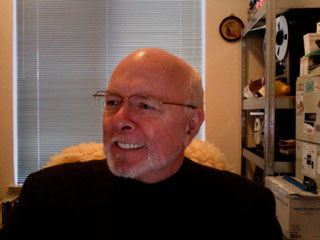
Murry Stapp enjoying retirement in 2009. But with fond memories of radio.
What an ego trip for a 16-18 year old teenager to be able to go on the air and play music and commercials! I really loved it.
I want to thank Duane Hill! He bought KAOR in April 1969 and he was the first boss I ever had. I know I probably caused him some gray hairs and ulcers due to my lack of experience and lack of maturity. But, thanks Duane, wherever you are!
Unfortunately I do not have any air check tapes from KAOR. But I do have some tapes Scott and I made when we answered the phone call request line during the evenings. ("Can you play 'Indian Giver' or 'Dizzy'?") Some of those recordings are hilarious!
During my tenure at KAOR I got to play some of the new hits that were coming out. I remember the music director, Dudley, coming by one afternoon. We laughed at the title and artist of one 45 that he had brought by. I listened to it and then set it up to play. I introduced the song as kind of a joke and predicted that it would soon fall into the abyss of oblivion because it was so bad. Was I correct in my prediction? Not quite - "Sugar Sugar" by the Archies went on to become a #1 hit for 4 weeks. Not one of my most accurate predictions!
I even did my first news interview at KAOR. It was with Jan Claire. He was the director of Sing Out Oroville. They were a group of talented high school students who crossed the country by bus and performed all over.
When they came back home in June 1969 I was there to interview Jan. I did the interview and then discovered that the tape recorder had not worked. But Jan was gracious enough to redo the interview and I was very pleased with the results.
Jan was one of the early radio pioneers at KAOR. He was also Program Director, Production Director and Operations Director at KPAY radio in Chico for many years. He is now living in the lap of retirement luxury in the Sierra Nevada foothills.
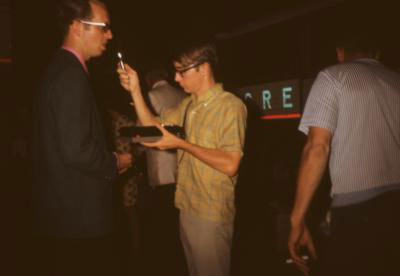
Here I am interviewing Jan Claire during the second interview. You can tell that I really was making sure that the @#$%&* tape machine was working! June 1969.
During that time I was in a quandrey; The Vietnam War was hanging over my head and I really didn't want to go to war but I didn't want to go to college either. I just didn't know what to do.
Later that summer my friend Eddie Harrison joined the Navy on the 120 day delay program. As I was afraid I would get drafted into the Army I decided that if I joined now maybe I could go in at the same time as him.
So, on December 2, 1969 I entered Navy Boot camp. Radio was out of my head and Vietnam was in.
During my Navy career between 1969 and 1973 I served in Dixon, California at a Navy transmitter site and served aboard the USS MAUNA KEA, an ammunition ship and the USS ORISKANY, an aircraft carrier.
During my time in the states between two tours off of the Vietnam coast I was invited by my friend Scott Roberts to do an oldies show at KCSC at Chico State College. I did the show in July of 1972 and had a blast. I still have some of the tape of the show and it was a lot of fun. It still showed that after almost 3 years I could still do radio.
In August of 1972 I flew back over to Southeast Asia and met my ship, the ORISKANY. ORISKANY was much bigger and had more facilities than MAUNA KEA. ORISKANY even had a radio station!
KRIS radio (97.3 FM) had no transmitter. It was wired into the ship's spaces where 3,000+ sailors lived and worked 24 hours per day.
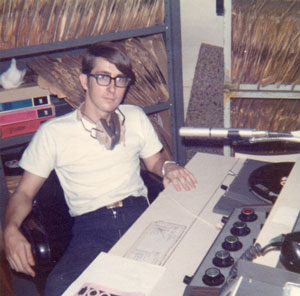
"97.3 FM - This is KRIS!" October 22, 1972.
DJ's on KRIS were allowed a one hour show per day. KRIS operated any day we were out to sea, which was the vast majority of the time. We would go into the combat zone off of the Vietnam Coast for 30 days and then go back to either the Philippines or Japan for one or two weeks. Most of our time off was spent in Subic Bay, Philippines.
Sadly, most show recordings from KRIS have dissolved themselves but I do still have a show schedule that shows my show time was 3 P.M. That was my normal show time each day.
These KRIS shows were the last ones I ever did where every song played was by record.
When I separated from the Navy in late 1973 I had no real thought of going back into radio. I had come to the conclusion years ago that there was not a lot of money in radio and jobs were pretty hard to come by and keep. So I got into government work and have worked in County Government here in California from 1974 to the present.
During the years of 1974 through 1989 I worked in Veterans Services and did 4 or 5 radio talk show interviews on radio station KOBO and one on KMYC. I also did a couple of public service announcements on TV station KHSL. This experience kind of satisfied my yearning for radio experience during that time period.
So for 24 years I thought about radio and missed doing it but had no hope that I could ever get back into it. I am not the only old DJ who has radio in his blood. I think most of us do!
But in the Fall of 1997 Harlan Communications broadcast part time DJ recruitments on their two stations - KUBA and COOL 104. My wife, who knows what a ham I am and how much I missed radio told me about the recruitments and encouraged me to apply.
So I completed an application and compiled some air checks from KRIS and KCSC and applied. Fortunately, I and 5 others were selected to go through a 6 week training course to become DJ's.
Of the 6 of us, 4 made it through the training and I found myself working Saturdays on KUBA (AM 1600).
KUBA had been around since 1948 and had been a Country station for the prior 10 years. Even though I was not much of a country fan I took to the station right away. It was a non-automated station which meant that we played CD's, no 45's or albums either, which seemed strange to me but I did discover that CD's skipped just as much as 45's used to! I would work most Saturday nights from 6 P.M. to midnight and then baby sit the FM station until 1 A.M.
I had a lot of fun. I even got my wife to record (and she is shy!) a promo for me. I also got Joe Greer, a co-worker at my day job, to record a couple of promos for my show as a character "Farmer Joe from Sutter". He would also talk to me live on the air via phone and tell bizarre stories about his cats and his "farm" in Sutter.
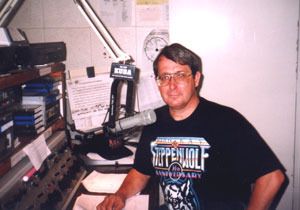
Me at KUBA. June 20, 1998.
So, from October of 1997 through April 1999 I played Country Music on KUBA. As time had gone by we had obtained RCS (automation) equipment that improved the quality of our sound but also made a lot of the DJ's concerned. They were afraid they would lose their jobs. I wasn't worried as this was a part time fun thing for me anyway. Great people I worked with during this time were RJ (Randy Joe) Blount, Dave Bear, Skip Morgan, Derek Moore, John Black, Sean Gray, Kavin Connor, Bill Roberts and Dave Paulsen.
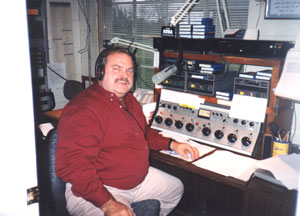
The multi-talented Skip Morgan at KUBA. He loved playing that country music - but didn't like Shania Twain! March 1998.
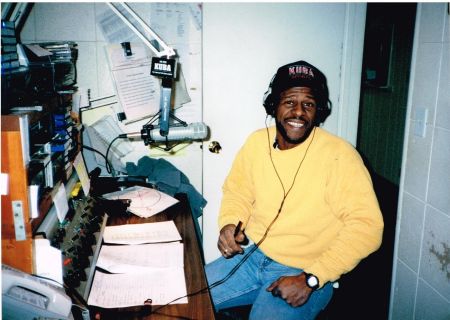
Kavin Conner doing his evening show in March 1998 at KUBA.
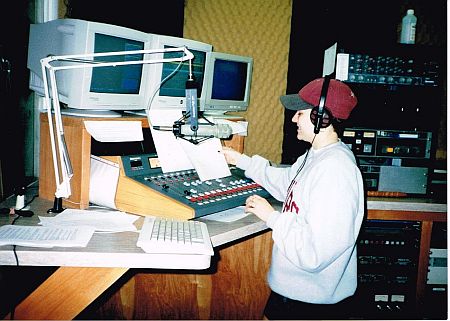
Summer Lynn doing her afternoon show on COOL 104 FM in March 1998.
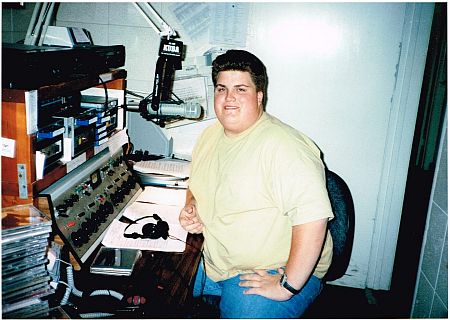
Bill Roberts at KUBA in March 1998.
Events in April of 1999 came as a shock for a lot of folks. KUBA announced that it was abandoning Country Music and was going to a rather "adult contemporary" format that included a lot of hits from the 50's, 60's and 70"s. The format was called "America's Best Music - Great Singers and Timeless Melodys". This was definitely not hard core rock but a lot of "middle of the road" hits (i.e. Sinatra, Nat King Cole, Perry Como, etc). The other shock was that folks like Sean Gray and Skip Morgan were let go, mainly because KUBA was going to be automated except for the morning show with Dave Bear. I expected to go also as I was not sure that I had a place anymore.
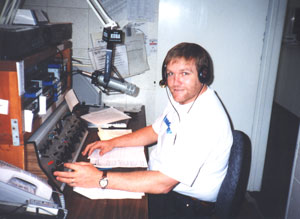
John Black at KUBA. One of the nicest guys and most talented voices in north valley media - March 1998.
However, I was informed by Derek Moore that I was to convert over to COOL 104 (103.9 FM). So from April 1999 I was a member of COOL 104's staff playing 80's and 90's new rock. For a time we were also playing 70's music, which I preferred.
COOL 104 had RCS automation also. I worked with the morning team; Moe Howard and WC Fields. Also great to work with were Dave Bear, Derek Moore, Briggs Moor, John Black, Estelle Renae, Summer Lynn and another part-timer, Pam Novack.
COOL 104 was fun to work at and it was easier than the old KUBA. We did not have to pull our commericals and CD's to play as they were already prescheduled. All we had to do was announce the songs and do PSA's and station promos, along with my bizarre stories and dumb comments, within the schedule structure.
In 1999 Derek Moore left and went to KWOD. Then in 2000 Briggs Moor went to an FM station in Fort Bragg (he later returned for awhile to KUBA and COOL 104). So the old gang was breaking up. Since I came to work at KUBA and COOL a lot of DJ's had either left for greener pastures or been let go.
Even though the work was easier due to the automation, the work was also less of a challenge and less interesting. I still enjoyed the on-air time but the time in between the breaks (some times more than a half-hour) made a show drag.
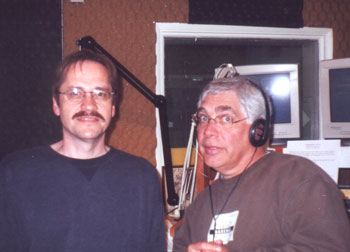
Moe Howard and W.C. Fields during their COOL 104 morning show on April 19, 2001.
In 2002 Moe and W.C presented the Morning Show on KUBA. Sadly, their last show together was on September 10, 2002. Moe retained his shows on COOL 104 and KUBA. Moe still does his "Moe In The Morning" show on KUBA (2014). W.C. advises that he went on to bigger and better things. They leave a very talented and memorable legacy in northern valley radio history!
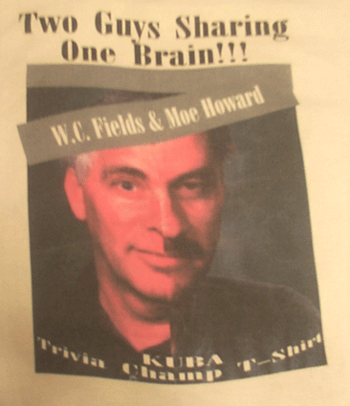
Moe and W.C.'s Classic (and schizophrenic!) Trivia Champ T-Shirt.
I did promos for "Moe and WC", the morning team and even asked if I could do "voice tracks" (recorded shows) in order to get more air time without having to spend a lot more time at the station. But my request for voice tracks was not acted upon.
After 3 1/2 years I decided that I wanted to take a break and do something else. I decided that my priority would be to do some more writing. (During the next 2 years I had an article published in May 2001 and also had two of my stories published in a collection of works in December 2002. Additionally, I worked a lot on my various web pages and also began work on my second book.)
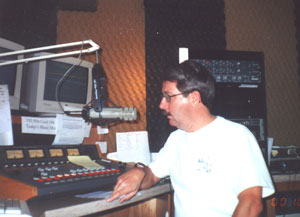
Me at COOL 104. October 2000.
I left Harlan Communications after my last show on January 27, 2001. It was bittersweet and I did miss the act of fashioning a radio show and the ego trip and fun that can be had in radio. But I came to the conclusion that I had "been there and done that".
After I left, KUBA/COOL 104 station manager Bob Harlan said,"Frankly, you were well received on the air... one of the few people who was able to talk one-to-one with listeners, which is the hallmark of good community broadcasting. And, it's true that we would welcome you back whenever you're ready". So I feel pretty good about having left the way I did.
Neil Thorson had been the "mid-day guy" on KUBA for several years and had done a great job. In the Spring of 2003 he decided to do other things and I heard it through the grapevine that he was retiring from radio. So I contacted Bob Harlan and we set up a meeting. He and Dave Bear offered me his show time frame and I could not resist accepting it.
So on March 4, 2003 I reentered my radio career with KUBA and did the mid-day show from 10:00 A.M. to 3 P. M. I got to play some of my favorite "oldies" music and enjoyed every moment of it.
During most of the time that I worked for KUBA during this period, I became acquainted with Rex McNeill, a great DJ who did a very well received show on COOL 104. He and I appeared (and harassed each other) on each other's shows and had a great time. He was always there to add a lot of confusion to my regular routine.
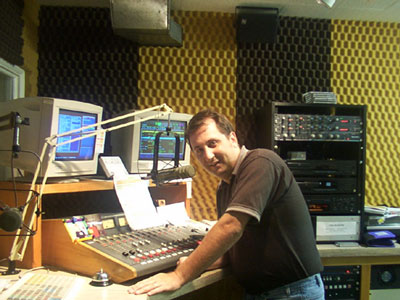
Highly talented and a real nice guy - Rex McNeill doing his COOL 104 show on June 23, 2003.
With the demise of COOL 104, Rex began doing the Morning Drive show on "SUNNY 101.5 FM" in Yuba City on February 17, 2004. Since then he has moved on to KNCI FM 105.1 in Sacramento (2014).
So, back in the 60's, I used to "cue" up 45's and albums and use 4 track "carts" to play commercials. Now everything is pre-scheduled on the computer screen. But the thrill is still there no matter which bit of technology you use!
My years in radio have been wonderful. A time of fun and a time of good friendship with my fellow radio people. I do miss that when I am not in radio. During those years when I have not been involved in broadcasting I have missed the creativity and the fun of radio. Every once in awhile I popped in a tape of an old show from a few years back and relived the fun I had. I guess they were right when they told me that once radio gets into your blood, it never leaves.

PART TWO: "THE DEMISE OF COOL 104!" "KUBA MERGES!" - "KUBA FORMAT CHANGE - 'CLASSIC HITS OF THE 60'S AND 70'S'"! - "MY MISSING VOICE IN THE MACHINE!"
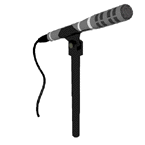
The year 2004 brought a lot of changes to KUBA and COOL 104:
Just prior to January 2004, both KUBA and COOL 104 were bought by separate corporations. KUBA was bought by Marathon Media and COOL 104 was bought by First Broadcasting. COOL 104, as we knew it, went silent at midnight the night of January 8, 2004. The frequency (103.9 FM) ceased to be a Yuba City station and now exists as a Sacramento station, playing religious music.
COOL 104 regulars, Briggs Moor and Rex McNeill were hired by Yuba City's SUNNY 101.5 FM and COUNTRY 103.1 FM KKCY.
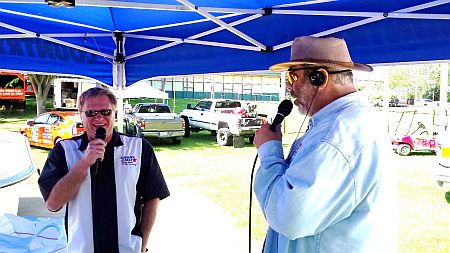
I ran into Briggs Moor and Dave Logasa at the Home, Garden and Recreation Show on March 28, 2015. They were doing a remote broadcast for KKCY. Nice to know that some "live radio" is still alive in Yuba/Sutter.
Harlan Communications and KUBA were merged with Nevada County Radio (KNCO AM and STAR 94.1 FM) in Nevada County - a great bunch of people.
Fortunately, through all of the changes in 2004 I still retained my mid-day show on KUBA! It was great to still be working with John Black, Moe Howard, Dave Bear, Bob Harlan, Dave Paulsen, news guy Chris Gilbert and the rest of the KUBA crew. These guys are legends!
As of May 24, 2004 KUBA's format changed to CLASSIC HITS OF THE 60'S AND 70'S! I loved the new format and I felt that I fit right in. It's something I had been lobbying for for a long time. The station was a part of me and I felt a part of it. I also felt that my experience and knowledge were appreciated!
And I do think that my talents were appreciated. However, the appreciation of radio talent is not always the most important thing that radio management looks at. Money talks and it was determined that it was cheaper to have the full time regular DJ's do the voice tracks. So I did my final radio show on KUBA on January 14, 2005.
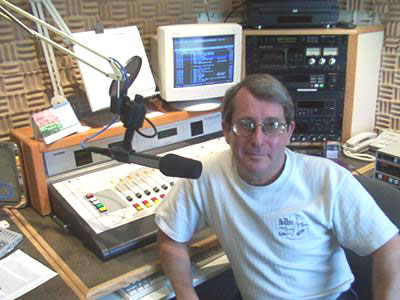
I felt sad about being off the radio, but what a wonderful ride it had been! I had done over 450 shows in the prior 22 month period. I had been on the air for 5 of the 7 preceding years - not a bad record. To this day I still flash back to 1997-99 when I was doing live radio at KUBA playing Country Music into the night. What fun and what a rush! I have nothing but warm feelings and great memories of the folks at Harlan Communications and Nevada County Radio.
Since 2008 I've seen some of our local DJ's, replaced by out of town contract DJ's. Most local radio is not local anymore. Some highly talented DJ's have been cut back to half-time. Very sad. Money is tight and things don't appear to be getting better.
In August 2010, KUBA was bought by Results Radio. Their stations include Sunny 101.5 FM and Country 103.1 FM KKCY. It appears that KUBA's format will stay the same. Fortunately, it also looks like most KUBA employees will keep their jobs. Let's hope that good, local radio will flourish at KUBA with the sale to this rather large, and reputable broadcasting company.
I just feel fortunate to have been in radio when I was. Those were the good old days!
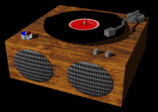
(Playin' those old LP's.)


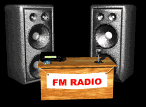
PART THREE:
RADIO IN THE 21ST CENTURY
The 1960's and 70's were the last bastion of old time radio. What was different about it back then? It was the feeling you got that your disc jockey was talking live, right to you.
When I was a teenager in the late 60's you knew that your home-town AM Radio Station was live. The DJ was right there, talking to you in "real time". He had the latest news, weather and was actually playing the '45 or album that you were hearing. He also promoted a lot of music functions that occured right in your area. He also may have participated in those functions and had become a local celebrity of your town. In other words, he was part of the community.
I used to love to listen to Dave Lane at KAOR in Oroville, CA. He was funny and I had this great image of what he looked like. I also liked to listen to KMYC in Marysville. People like Hal Murray were there to play the latest Beatles, CCR or Stones records. Another favorite was to listen to Chuck Roy or Bob Sherwood at KROY in Sacramento.
It was a great era because it was so exciting. The music was new and fresh and it rocked! The personalities were fun and when you called them at the radio station it was exciting to talk directly to a celebrity. You also knew that these DJ's were real people because once in awhile they made a mistake and showed you that they were human. How many times did I hear one of them start to play the '45 on the wrong speed!
In 1967, I actually got to meet my hero Dave Lane when I began to work on a high school radio program at his station. Was I shocked! Dave didn't look or act like I thought he would. I then discovered that most radio personalities were really quite different than their on-the air personas. Not bad - just different. But in many cases they were nicer people than I had imagined.
Radio has changed a lot in the past 30 years. The FCC has relaxed a lot of its control over program content. Some feel that the FCC should again take charge and censor some of the content that we hear. Certainly the dirtying up of the airwaves has changed the image of the DJ from the clean cut personality to one that may be less than scrubbed.
However, the major change in radio broadcasting has really nothing to do with the content of any given radio show. Most shows still feature a DJ personality and music. That has not changed.
What has changed is the way the program is presented to you. The change has been brought to you by a company called "RCS". Now, RCS is not the only company, but we will us it as an example.
RCS is a company named "Radio Computing Services" that produces a product called Selector Computer Software. RCS's own advertising states that the software was created in 1979 and since then it is used by virtually every radio station in the 100 largest markets. It is used by over 3,000 radio stations on 6 continents.
RCS allows a station owner to lower the level of his live staff and reduce costs while improving the sound quality of the on-the-air product. RCS is a computer system that allows automated scheduling of songs and commercials and allows the remaining, small DJ staff to record their on-the-air comments on "voice tracks".
It's always been costly to hire a human being to sit there for a 6 hour shift and do a live radio broadcast. Now, no one has to sit there for hours, spin CD's and push buttons to play commercials. It's easier, cheaper and less time consuming.
My minor radio career ranged across several decades from the late 60's into the automation age. I know from this experience that doing a show with automation can be less exciting for the DJ because you don't have the challenge of actually creating the show the way you used to have to do. There is something greatly exciting about "flying by the seat of your pants" and doing a "real" live show.

Most AM and FM stations now are at least partially automated. Some morning shows do have live personalities. We have some very good morning show personalities locally. But that is pretty much the extent of the live programming.
Some stations have no live programming. What you hear is either RCS or a show bounced off a satellite from back east.
Automation has also resulted in the loss of DJ jobs. Why hire a staff of 10 to do live broadcasts when you can get by with 2 or 3 to do commercials and "voice tracks" on RCS equipment?
You can't really blame radio station owners for converting to automation. After the initial large investment for the RCS system there really is a long term cost savings and the quality of the music sound is better.
I spoke with Derek Moore. At that time Derek worked for KWOD, 106.5 FM in Sacramento. (Fortunately, Derek went to work for "Classic Rock" 96.9 FM - THE EAGLE in Sacramento in December 2001. Great Station - Even I listen to it! He greatly deserves the step up.) Derek has been a DJ for 13 years, having worked for Rock 95 in Modesto, and KUBA and COOL 104 in Yuba City. Derek still works in Sacramento radio (2014).
"Basically, RCS is a double edged sword. I see benefits and the downfall. I like RCS because, for one thing, it's digital. The quality is better, plain and simple. It's also nice to know that you don't have to physically select your own music, or commercials. Plus, everything is right in front of you. Finding a requested song is a lot easier. From a business perspective, I can understand it, also. Even more so in a small market. You have all of this overhead, but you're not making much of a profit. Having RCS save money for the smaller station. However, that also could be negative, because at one time, small market stations were considered to be the breeding ground for up and coming talent. Who are those people now? When you're automated with some guy in Texas doing voice tracks, or a sales person is doing them, then what does that leave for the person with potential?", Derek said.
But barring any thought of cost savings, what is the best for radio and the public?
Derek said,"I guess if I were to weigh in favor, or against RCS, I would weigh against it. It's not live, it's not real. You are unattached from your audience. How are you going to know what songs are the most requested if nobody's there? You don't know what your audience wants if you're automated. Think about something huge happening? Let's say the President is killed in a plane crash. Guess what? You're automated, acting all cheery. As if nothing has happened. That immediacy is important, for that breaking news, that caller, those flash floods that may be rolling in, etc. RCS, to me, embraces mediocrity."
I have recently heard the same sentiments from a very well known radio personality in our area (who shall remain nameless). Seems that automation is not cracked up to what it seemed to be.
But is there anything else the listener is losing out on due to automation? Maybe the loss is psychological. Maybe it's the loss of the connection we had with a human being that we knew was live on the air and who seemed to really care about what he was saying and playing. Maybe it's the difference between hearing a live DJ and just listening to a juke box. It's just not as real, personal or as exciting.

I think that there is a "real art" when the DJ does his best to make the "voice track" show sound "live". It takes a lot of effort but it IS possible. I, personally have been involved in voice tracks. But it still takes a "live" person to delete or modify those tracks in case something of importance makes those tracks outdated or a lower priority if dictated by ongoing events.
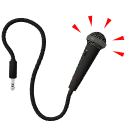


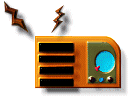
PART FOUR:
SOME MISCELLANEOUS STUFF!:

MY COOL 104 BIOGRAPHY:


WHEN "OLD" RADIO GUYS GET TOGETHER:
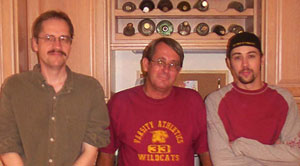
Moe Howard (KUBA), Me and Derek Moore (now at 96.9 FM, THE EAGLE) got together for a reunion, at my palacial mansion in Yuba City, on July 28, 2001. There weren't many Corona bottles left standing! (Our respective wives and/or girlfriends were also there, so it didn't get too wild!)

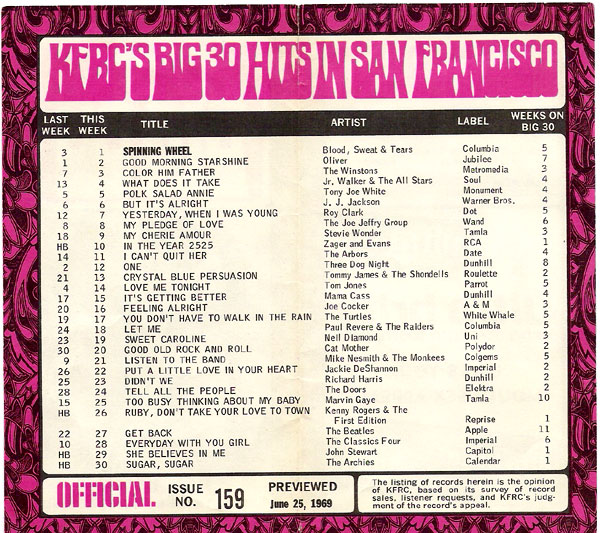
This is what we played at KAOR in the early days. Yes, we did steal info from KFRC surveys!

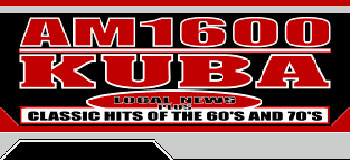
KUBA LOGO

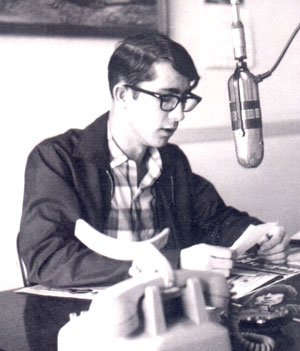
Way back in December 1967, at KAOR, I still had those dumb "Buddy Holly" glasses. Maybe they didn't look so dorky back then?.....Oh yes they did!
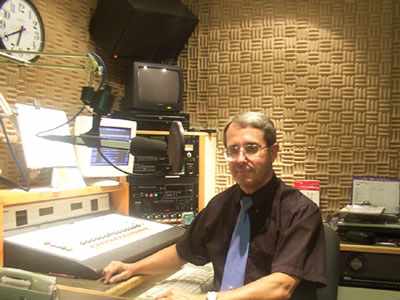
In December 2004 at KUBA:....37 years older (and just a COUPLE of pounds heavier)....I was enjoying radio more than ever! (Yes! That IS all my own hair!)

PART FIVE
A SLAB OF CONCRETE.......
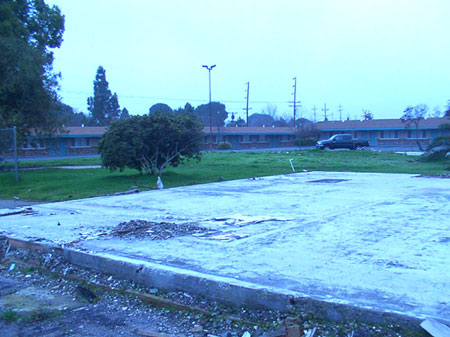
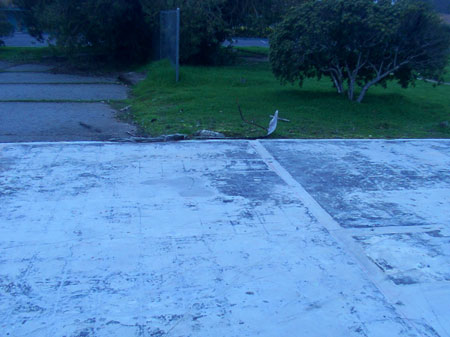
....was all that was left of the KAOR studios that I first knew in 1967. I took the above photos in January 2004. The slab was in an abandoned parking lot next to Prospector's Village Motel off of Oro Dam Blvd in Oroville, California. Surprisingly, the concrete was still imprinted with the bases of the walls and you could tell where the offices, studios and prod room were located. You could even see the imprint of the cabinets that supported the turntables and the control console. When standing on the slab I felt that I was back in time. The memories of the sights and sounds of those days at KAOR seemed to linger.
In January 2008, new construction started for an expansion to the motel and this slab was removed and the area covered over with a new building.
Now only fond memories remain of the station that gave me my start so many, many years ago.

SPECIAL MENTION! MANY THANKS TO THE FOLLOWING DJ'S WHO PROVIDED A GREAT INFLUENCE AND HELPED ME IN MY RADIO CAREER OVER THE YEARS!
Ron Palmer, Curt Nelson, Murry Stapp, RJ Blount, Moe Howard, John Black, Dave Bear, Derek Moore and Bob Harlan.

THIS PAGE WAS ESTABLISHED ON MARCH 21, 2001.
THIS PAGE WAS RECONSTRUCTED ON SEPTEMBER 22, 2005 (after a major calamity).
THIS PAGE WAS LAST UPDATED ON JUNE 2, 2024.



Larry Matthews
PLUS 5112 TIMES PRIOR TO THE WEB SITE'S RECONSTRUCTION.
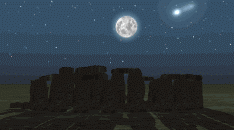
THIS IS A "LARRY" WEB SITE.
Please check out my other web sites at:
- LARRY'S WEB SITES
-
